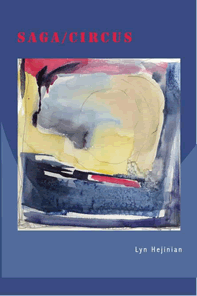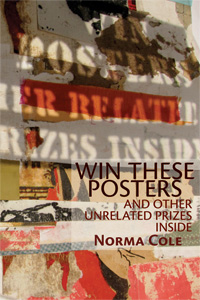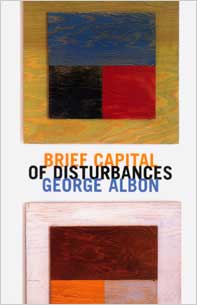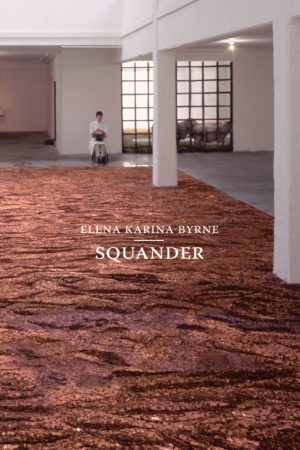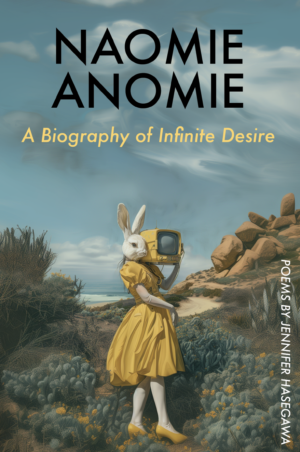Description
Saga / Circus, by the esteemed poet Lyn Hejinian, brings us two distinctly different long poems in which the tropes of narrative and lyric—their feints and demands—stake claims amongst the actual characters presented. In this playful yet penetrating pair of poems, it is the character of Lyn Hejinian’s thought meeting our character of thought that is one of the most exciting and most constant dramatic events of the book—the richly sensational & subversive crescendos register as both melodic and discordant soundtrack.
Here is the marvel of putting learning into play, ventriloquizing it as a puppeteer might. The “characters” emerge out of the text, first as names, then as activities, then like events with personal qualities—which then become part of the social affect, the climate of the text, the whole buoyant and mournful circus. It is all so very active. Along comes Lola!
Carla Harryman
In her Saga, “The Distance,” Hejinian writes, “I’ve tried to give emotions/The slip/By attributing them to other people/Named Felix, Sasha, Nils, Miroire, and when a new one/Rises I will call it Sam…” suggesting that her constant stream of proper names is a trick invented to enable her to write her way through a poetry of the emotions. In fact it is an excellent trick, one that is as plain and direct a method of negotiating our particular moment and the questions it raises, for example “How in a world as totalizing as the one in which we live, can we imagine “metamorphoses” if “We are all so busy…the only time we can appreciate/Existence is when we are at sea/Subject to capriciousness”? Too busy to contain ourselves on land, we must keep ourselves populated by others; it is the responsible and responsive thing to do. In Hejinian’s work, it provides a means of mediating between the need for real in a post-real, the need for some utopia in dystopia, and a small but significant way of finding “paths” into the community to come.”
Rachel Levitsky
About the Author
Reviews
Excerpt
Lyn Hejinian is a poet, essayist, and translator. Her groundbreaking book of poetry, My Life, published by Sun & Moon / Green Integer, has had five re-printings from 1980-2002. Her most recent books include A Border Comedy (Granary Books, 2001), Slowly and The Beginner (both published by Tuumba Press, 2002), and The Fatalist (Omnidawn, 2003). The University of California Press published a collection of her essays entitled The Language of Inquiry in 2000. In the spring of 2007, she was elected a Chancellor of the Academy of American Poets. She teaches in the English Department at the University of California, Berkeley.
This pair of new long works from the California-based experimental poetry master (The Fatalist) makes a fine introduction to her current powers. Hejinian—admired in avant-garde circles since the 1970s—combines epistemological investigations with deft jokes.
In Saga/Circus, Hejinian plays with the line and the sentence, creating a torque that contorts syntax and movement into often unrecognizable shape. Meaning is not lost amidst this frenzy, it is discarded. This is first seen in “Circus’s” chapters, which never get beyond the integer three. Showing her penchant for ecology, Hejinian chooses not to use more numbers but simply recycle them into such items as “Chapter Between Two and Three” and “Chapter One Two,” with the latter being preceded by the metalingual text “Now we’ll go from Chapter One to Chapter One Two.” “Circus” is a Dadaist soap opera which would confound the afternoon addicts and render it unfit for prime time—something like Saturday Night Live with its unfit-for-prime-time players. But then, Hejinian creates her own cast of unfit characters.
The first half of Ms. Hejinian’s book half caught me in mid-air, perhaps more like a trapeze artist between swinging hand-holds than a swallow in mid-flight. She presents a reader with a circus-like profusion of those knotty, paradoxical moments when words enchant, and misguide, cause our sense of being securely anchored in our lives to slip, transforming us to a crowd of clowns within our skin, slipping on hidden banana peels everywhichway
Hejinian’s working a terrific line, one that’s willing to go “out” to magnificent ends, or stop short, break off, entirely, blissfully flexible. I want to call it a glacial line—it picks up everything in its path (and’s capable of eventually depositing it anywhere). Never compell’d before to attend to the line-breaks: here, the highly enjamb’d lines work up ambiguity, irony, wonder, by turns.
Saga and Circus are two distinct, book-length poems in which Lyn Hejinian continues her original explorations with language and form. Circus is a series of prose poems/Flash fictions where characters act in unexpected ways as they reflect on common human experience. Saga is a series of 37 long-lined sections, each imagining a long journey on a sea-going vessel. The result is a complex dance of metaphor, distraction, and unexpected union. Hejinian proves once again why she is one of the most radical and important writers we are fortunate to have.
Hejinian knows, even when you’re noodling stray tunes on the keys, you’re still “playing the piano.” The anti-novel, too, is a novel, and much as the L=A=N=G=U=A=G=E writers long to subvert, it’s the pleasures of their work—rather than the social critique—which most appeals. The crack-up of form and language adds to the pleasure of that language—spicy food, sharp whisky, rough massage.
from Saga
IV
According to the Greeks metamorphoses have to be complete
And are impossible. Things may change
But nothing can become the opposite
Of what it is. The sky cannot
Be not the sky, the distance not distant. Yet
I can see it
Both ways. Then yet
Again I hardly remember who it was
I was instead of this
Back when I gazed
Up through branches tossing in the wind at the blue
Perimeters of the clouds and felt uprooted even
At an early age perhaps from gods, my deities
Were streaming
Or grinding like a boat being hauled over stony ground. The sound
Gives me pleasure still
Though it is fugitive. Pleasures are synonymous
With powers
And lest they become dangerous they must be
Fugitive. How strangely our course approaches
Forks, how variously we decide which tack
To take. We ourselves are fugitives,
The world is strange. It appears to last and appears so as to last
Through the dark of night or of storms into which it disappears
To last as well. We have come in
The dark upon landforms, shores, islands without knowing
What to expect. On some one may enter
Into friendship, on others into endless complaint.
But there must be more to friendship than a placid acceptance
Of misunderstandings and interruptions, though these have the effect
Of timely inevitabilities that we encounter
Constantly. Someone remarks “there’s something
Over there” or, more urgently, “there’s something ahead!”
The boat tacks —I say that though the engines are running.
We have no destination. One can’t foretell
What may or may not be pointless. The boat
Arches, bends, turns—it is shaping itself. I dream
Confusedly that we’ve “varied” and come to an island
Which can be approached
Only through one of forty doors at each of which sits
A restlessly perched bird, some one of which may disclose some singular logic
To me in an ancient seasonal language which I will understand.
The gist of what occurs according to the birds is repetitive
Unlikeliness (or unlikelihood—it isn’t clear which). We are all so busy
It seems sometimes that the only time we can appreciate
Existence is when we are at sea
Subject to capriciousness
Though we sleep slung in binding hammocks like spiders
Or netted fish or trapeze artists bouncing near
Ground level at the end of their act. At night
The several sequences of sea
Twist in turbulence. Observing the effects I grow vertiginously
Calm. How odd it is to be
Out. At best one can know only the knowledge
Of one’s time. When one reaches
The limit of that one must make way
And I say so hospitably. Between ourselves
We speak the language of these parts. The communications are never
Concise. Whatever we say is best understood
If contextualized, so contexts are
What we say, and they too are best understood if contextualized
And so it goes, sometimes inward and sometimes outward
Bound not round
And round but as if over the bridge
From top to toe
Or pegbox to tailpiece
Of a vast violin strung
To what we think of as strung
And we cling to it as to a shroud.

